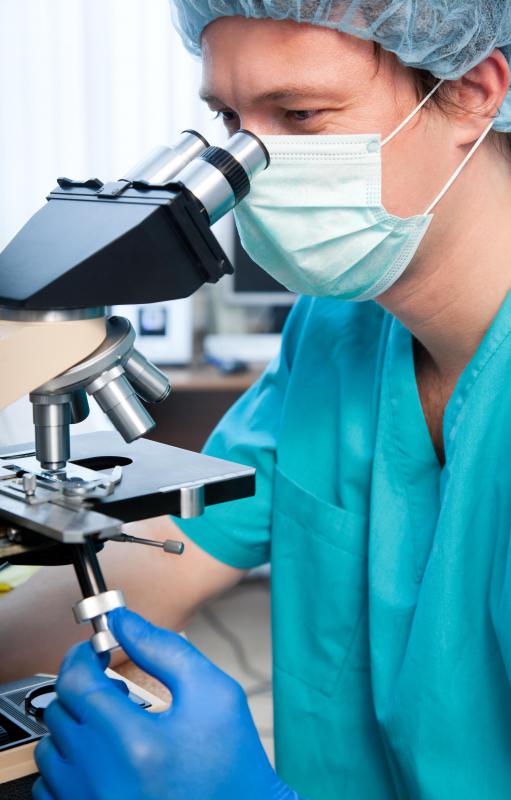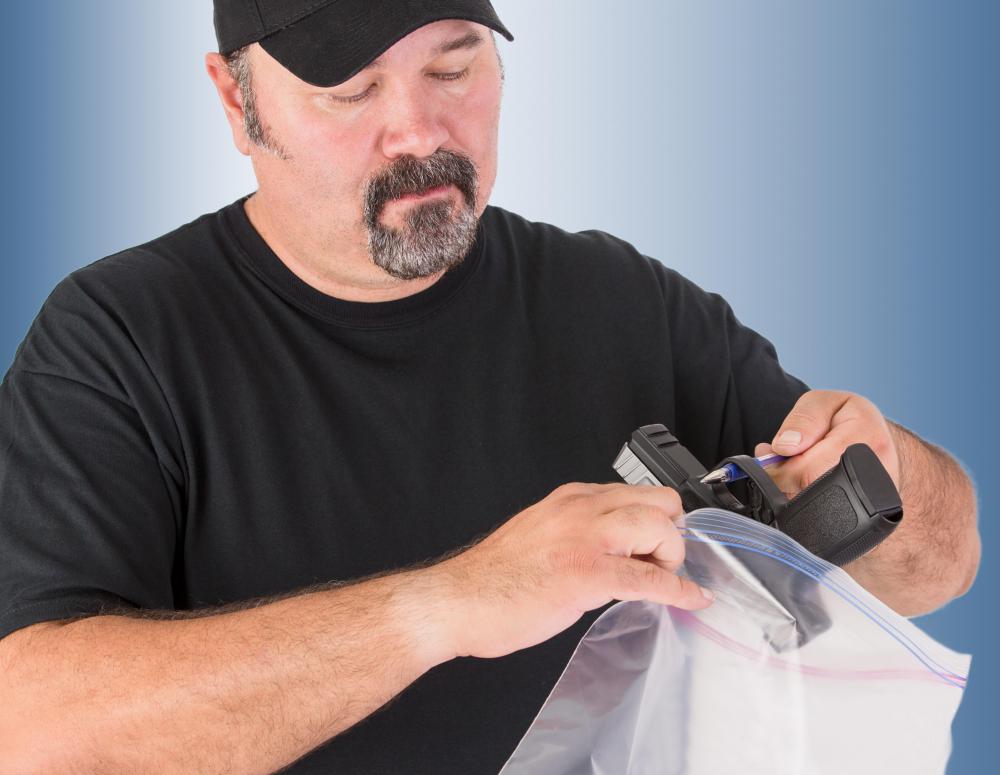At MyLawQuestions, we're committed to delivering accurate, trustworthy information. Our expert-authored content is rigorously fact-checked and sourced from credible authorities. Discover how we uphold the highest standards in providing you with reliable knowledge.
What is Crime Scene Analysis?
When a crime is committed, evidence is often left behind. Crime scene analysis is the process of collecting evidence and studying it. This analysis is one of the first steps to help investigators piece together a crime. For example,where the blood is spattered or where bullet fragments are found can help investigators figure out how a crime occurred. Crime scene analysis can also help answer several other questions about the crime, such as time of death. It may provide evidence that can be used in a criminal trial.
Although crime scene analysis may start with the first law enforcement officers at the scene, specially trained crime scene investigators generally process the crime scene. One of the first steps is to secure the scene, which means limiting access to non-essential personnel. This helps prevent the crime scene from becoming contaminated.

Investigators may than walk through the crime scene, to get an overall picture of what took place. This is just an overview, with much more detailed analysis taking place. Photos are often taken and investigators take notes on details of the crime scene, such as smell.
Physical evidence is a large part of crime scene investigation. Crime scene technicians collect this physical evidence, such as blood or other body fluid samples, left at the scene. The crime scene will be dusted for fingerprints. Evidence of gun powder residue is also collected.

As technology advances and DNA evidence continues to play a large role in crime scene analysis, collecting trace evidence is becoming an essential part of analyzing a crime scene. Trace evidence includes material found at the scene, which may be very small, but may still contain DNA. Often even trace amounts of DNA evidence can make or break an investigation.

The evidence is carefully collected, so as not to contaminate it. Since investigators work with blood and other body fluids, disease transmission is a possibility. Crime scene analysts must also follow safety precautions to avoid contracting any communicable diseases. Evidence is properly labeled and may be transported to law enforcement laboratories for further analysis.

In the United States and abroad, crime scene investigators may be law enforcement officers who have received specialized training or college graduates of a forensic science program. Colleges and universities offer bachelor's, master's and doctorate programs in forensic science. Crime scene analyzers may find employment through various types of law enforcement agencies, such as the sheriff's department, city police and FBI.
AS FEATURED ON:
AS FEATURED ON:



















Discussion Comments
Well, actually, crime scene analysis is not what they say it is. It is actually a technique of profiling created in the late 1970's by three men in the FBI: Howard Teten, John Douglas, and Robert Ressler. They also created the BSU (behavioral science unit) at the FBI.
Who invented this crime scene analysis?
@Sunny27 - I bet that is true because you have to have a passion to work in this field because the work is not glamorous. I heard that sometimes you have to work overnight shifts and you always have to get your hands dirty.
I read that the federal government is looking to expand crime scene investigator positions and are also looking to raise the top of end of the salary spectrum to $95,000 for those with at least five years experience.
@Moldova - I know what you are saying but working on a criminal investigation can be really rewarding especially when you finally nab the suspect as a result of the evidence that you were able to compile. Crime scene investigators are giving the victim a voice that they didn’t have before and this is especially important if you are talking about a victim that is deceased as a result of the crime.
People that get into this field have a strong sense of justice and want to make sure that the perpetrators are caught so no one else can be victimized. I would image that people in this field feel like heroes everyday when they catch a criminal because the DNA crime scene evidence can make or break a case.
@Comfyshoes - I agree that it is fascinating, but I don’t think that I could work in the criminology field either as a crime scene tech or a profiler.
I think that it would keep me up at night. I remember seeing the movie, “Silence of the Lambs” with Anthony Hopkins and Jodie Foster and while I understand that that is a fictional movie it really spooked me. I have a lot of respect for the people that do this line of work because I know that the work must be really hard to do.
I think that it would so interesting to go into forensic psychology. Many schools now offer doctorates in forensic psychology because of the growing popularity of the field. Psychologists that were previously interested in this field had to get a doctorate in psychology and focus their post graduate work on criminal behavior.
I have a friend that was looking into this field and she said that a lot has changed and there are a lot more opportunities no than ever before. I think that it is amazing how these psychologists use criminal profiling to help the police determine what the likely suspect looks like.
They can tell by the type of weapon that was used for example if it was a crime of passion or if there was rage involved.
I know that the F.B.I hires a lot of criminal profilers to determine not only who the suspect is but the motive of the crime as well.
Post your comments